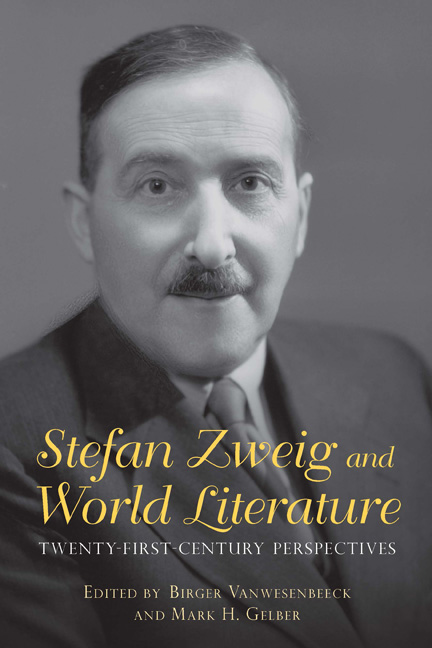Book contents
- Frontmatter
- Dedication
- Contents
- List of Illustrations
- Acknowledgments
- Introduction
- Part I Reception
- Part II Drama and Fiction
- Part III Criticism and Essays
- Part IV Politics and Exile
- 8 True to Himself: Stefan Zweig's Visit to Argentina in September 1936
- 9 Exile and Liminality in “A Land of the Future”: Charlotte and Stefan Zweig in Brazil, August 1941–March 1942
- 10 Stefan Zweig's Concept of Brazil in the Context of German-Jewish Emigration
- 11 Stefan Zweig: Life in Cities of Exile
- 12 The Writer's Political Obligations in Exile: The Case of Stefan Zweig
- Notes on the Contributors
- Index
10 - Stefan Zweig's Concept of Brazil in the Context of German-Jewish Emigration
from Part IV - Politics and Exile
Published online by Cambridge University Press: 05 May 2015
- Frontmatter
- Dedication
- Contents
- List of Illustrations
- Acknowledgments
- Introduction
- Part I Reception
- Part II Drama and Fiction
- Part III Criticism and Essays
- Part IV Politics and Exile
- 8 True to Himself: Stefan Zweig's Visit to Argentina in September 1936
- 9 Exile and Liminality in “A Land of the Future”: Charlotte and Stefan Zweig in Brazil, August 1941–March 1942
- 10 Stefan Zweig's Concept of Brazil in the Context of German-Jewish Emigration
- 11 Stefan Zweig: Life in Cities of Exile
- 12 The Writer's Political Obligations in Exile: The Case of Stefan Zweig
- Notes on the Contributors
- Index
Summary
This region is most delightful, and covered with immense forests, which never lose their foliage, and throughout the year yield the sweetest aromatic odours and produce an infinite variety of fruit, grateful to the taste, and healthful for the body. In the fields flourish so many sweet flowers and herbs, and the fruits are so delicious in their fragrance, that I fancied myself near the terrestrial paradise.
—Charles Edwards Lester, The Life and Voyages of Americus VespuciusThe above sentences are not quoted from Stefan Zweig'sBrasilien: Ein Land der Zukunft (Brazil: A Land of the Future, 1941). Amerigo Vespucci made this statement in a letter to his friend and client Lorenzo de Medici. Since Brazil's discovery by European voyagers in April 1500, this land has been as intrinsically linked to the Garden of Eden as it has been believed to be the promise of a great future. Almost from the start, an image of Brazilian society which emphasized its highly cordial and hospitable nature, as well as its apparently harmonious multi-racial society was promoted. These notions were passed down through the centuries and often considered to be the essence of Brazil, which appealed so much to the refugee writers who emigrated there to escape persecution by the Nazis. Many of them dealt with their country of exile in their works. However, there is no portrait of Brazil by an émigré that became as famous as Zweig's Brazil book. His hymn of praise not only decisively shaped the idea of the “land of the future,” but, together with his tragic suicide in 1942, it influenced the image of the German-speaking exile in Brazil. The phenomenal impact of his book derives from the prominence of its author. Zweig was undoubtedly the most famous émigré in Brazil— in fact, in all of South America.
- Type
- Chapter
- Information
- Stefan Zweig and World LiteratureTwenty-First Century Perspectives, pp. 191 - 212Publisher: Boydell & BrewerPrint publication year: 2014

